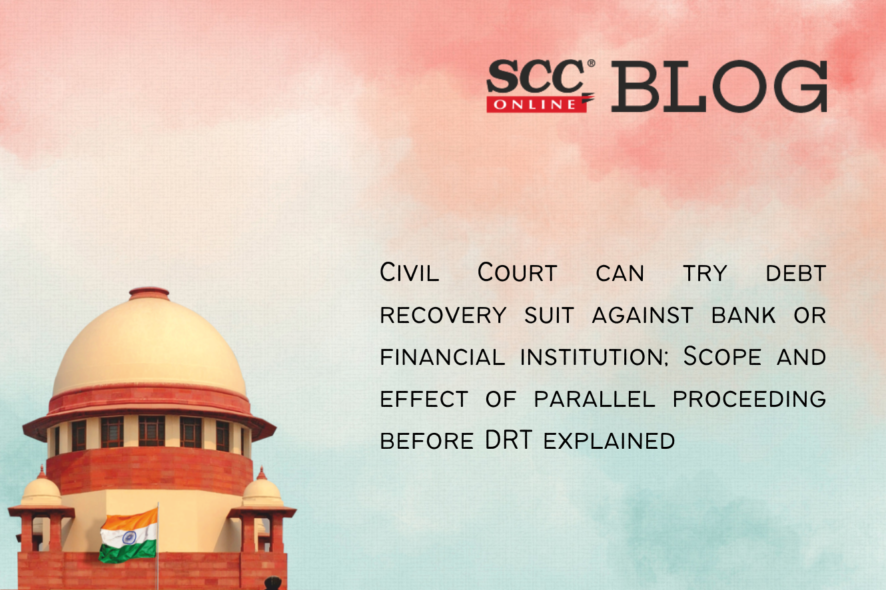Supreme Court: The 3-judge bench of Sanjay Kishan Kaul*, Abhay S. Oka and Vikram Nath, JJ, while dealing with the issue relating to the legal right of the borrower to initiate proceedings before a Civil Court against the bank or financial institution, which seeks to recover a loan amount against it, has held that,
- the jurisdiction of a Civil Court to try a suit filed by a borrower against a Bank or Financial Institution is not ousted by virtue of the scheme of the Recovery of Debts Due to Banks and Financial Institutions Act, 1993 (RDB Act) in relation to the proceedings for recovery of debt by a Bank or Financial Institution.
- an independent suit filed by the borrower against the bank or financial institution cannot be transferred to be tried along with application under the RDB Act, as it is a matter of option of the defendant in the claim under the RDB Act. However, the proceedings under the RDB Act will not be impeded in any manner by filing of a separate suit before the Civil Court.
- since there is no such power with the Civil Court, the suit can also not be transferred with the consent of the plaintiff.
- The judgments in United Bank of India v. Abhijit Tea Co. Pvt. Ltd., (2000) 7 SCC 357 and State Bank of India v. Ranjan Chemicals Ltd, (2007) 1 SCC 97 do not down the correct legal proposition.
- The judgments in Indian Bank v. ABS Marine Products (P) Ltd, (2006) 5 SCC 72 and Nahar Industrial Enterprises Ltd. v. Hong Kong and Shanghai Banking Corporation, (2009) 8 SCC 646 are affirmed except to the extent that they allow the transfer of a suit from the Civil Court to the Debts Recovery Tribunal (DRT).
Civil Court’s Jurisdiction
There is no provision in the RDB Act by which the remedy of a civil suit by a defendant in a claim by the bank is ousted, but it is the matter of choice of that defendant. Such a defendant may file a counterclaim, or may be desirous of availing of the more strenuous procedure established under the Code, and that is a choice which he takes with the consequences thereof.
While the RDB Act was amended from time to time, the Legislature did not, at any stage, make any further amendment for excluding the jurisdiction of the Civil Court in respect of a claim of a defendant in such a proceeding being filed along with the suit. The Legislature in its wisdom has also not considered it appropriate to bring any amendment to enhance the powers of the DRT in this respect.
Civil Court’s power to transfer suit
There is no specific power of the Civil Court to transfer an independent proceeding instituted by a defendant to be tried alongside a recovery proceeding before the DRT. A plaint can be returned only under the provisions of Order VII Rule 10 of the Code for the reasons specified therein. In the absence of such reasons, Section 151 of the Code cannot be utilised as a residuary power to achieve the transfer, which is really a consequence of return of the plaint when the grounds under Order VII Rule 10 of the Code are not satisfied. Hence, it would not be appropriate to read such power to transfer a suit to a DRT under Section 151 of the Code when the DRT is a creature of a statute and that statute does not provide for such eventuality.
Consent for transfer of suit
Once it is established that there is no power of transfer in the Civil Court, the consent or absence of it is not something which would lend such power to the Civil Court. The option before the defendant, who has instituted the suit, is clear – either he could file a counterclaim before the DRT or he could institute separate civil proceedings.
Parallel Proceedings before DRT
While there may be instances where a defendant may launch a suit before the Civil Court in order to delay the proceedings before the DRT and this may be in the nature of parallel proceedings, however, it is not open to a defendant, who may have taken recourse to the Civil Court, to seek a stay on the decision of the DRT awaiting the verdict of his suit before the Civil Court as it is a matter of his choice
“A claim petition before the DRT has to proceed in a particular manner and would so proceed. There can be no question of stay of those proceedings by way of a civil proceeding instituted by a defendant before the Civil Court. The suit would take its own course while a petition before the DRT would take its own course.”
In case of such an option exercised by the defendant who filed an independent suit, whatever be the nature of reliefs, the claim petition under the RDB Act would continue to proceed expeditiously in terms of the procedure established therein to come to a conclusion whether a debt is due to a bank and/or financial institution and whether a recovery certificate ought to be issued in that behalf.
[Bank of Rajasthan v. VCK Shares & Stocks Broking Services Ltd, 2022 SCC OnLine SC 1557, decided on 10.11.2022]
*Judgment by: Justice Sanjay Kishan Kaul
For appellant: Sr Adv V.V. Giri
For Respondent: Sr Adv Jaideep Gupta







